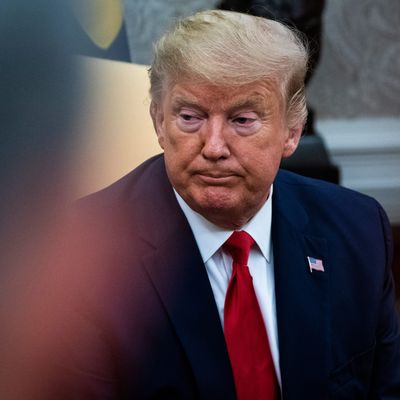
The Trump administration can’t decide why it killed Iranian general Qasem Soleimani. Last week, Secretary of State Mike Pompeo explained that the president had taken the extreme — and extremely illegal — step of assassinating a foreign official without congressional authorization because doing so was the only way to avert an “imminent” attack on Americans abroad that would have left “dozens if not hundreds” dead.
But this raised questions that the White House struggled to answer. Questions like: What exactly do you mean by “imminent”? Can the public or its elected representatives see the specific intelligence in question? And, how exactly would killing a single general prevent a nation-state from carrying out an attack that was already planned? (The White House’s answers to these queries were “days and/or weeks,” “no,” and crickets, respectively.)
Thus, on Tuesday, Pompeo changed his tune. Referring to small-scale attacks by Iranian-backed paramilitaries on U.S. bases in Iraq, Pompeo told reporters, “We know what happened at the end of last year in December, ultimately leading to the death of an American. So if you are looking for imminence, look no further than the days that led up to the strike that was taken against Soleimani.”
So: We killed Soleimani to prevent an attack that already happened — in other words, for revenge.
This story does little to justify President Trump’s flouting of congressional authority and international law. But a new poll suggests that voters find “we were right to kill Soleimani because he was a bad guy” more persuasive than “we were right to kill him because doing so kept Americans safe” — if only because they find the latter assertion implausible.
By a 55 to 24 percent margin, voters say Trump’s killing of Soleimani made the United States “less safe,” with nearly one-third of Republicans saying their president’s decision had undermined national security. Meanwhile, 63 percent of voters said that the strike made it more likely that there would be terrorist attacks on U.S. soil, and 52 percent said it made Iran more likely to develop a nuclear weapon.
Although only 24 percent of voters say Trump’s action made Americans safer, 42 percent of them say they support the strike, nevertheless. Even as a majority of the poll’s respondents agreed that the assassination was “reckless,” and had exacerbated just about all of the problems it was supposed to help solve, only 33 percent felt comfortable saying that they “opposed” the strike.
The reason for this dissonance may be captured by the results of a separate survey question: Asked whether killing Soleimani “shows Iran that the U.S. won’t be pushed around,” 53 percent of voters agreed.
This appears to reflect what some scholars call the “Jacksonian” streak in American foreign policy opinion. Historically, a large segment of the U.S. public is simultaneously skeptical of foreign entanglements and supportive of meeting challenges to their nation’s honor with overwhelming force. In this view, whether spilling an enemy’s blood achieves any practical objective may be less important than whether doing so secures vengeance and glory for the American nation.
All of which is to say, the American public’s assessment of Trump’s Iran “strategy” is, at best, ambivalent. Voters are reluctant to express disapproval of the slaying of a man who orchestrated attacks on U.S. soldiers in Iraq. But most also seem to believe that the assassination was counterproductive in every practical sense.
Taken together, the results suggest Trump will derive little political benefit from Soleimani’s death, as its recklessness accentuates the public’s underlying distrust in their president’s temperament. But the findings also indicate that, should the U.S.-Iran conflict escalate, antiwar forces may struggle to overcome the American public’s sympathy for retributive violence. As of last summer, 78 percent of voters told Gallup that they preferred “economic and diplomatic” means of countering Iran to military ones. But, in USA Today’s poll, voters said by a 55 to 21 percent margin that they would support airstrikes on Iran if its regime were to “kill a major U.S. officer in the Middle East.”






























